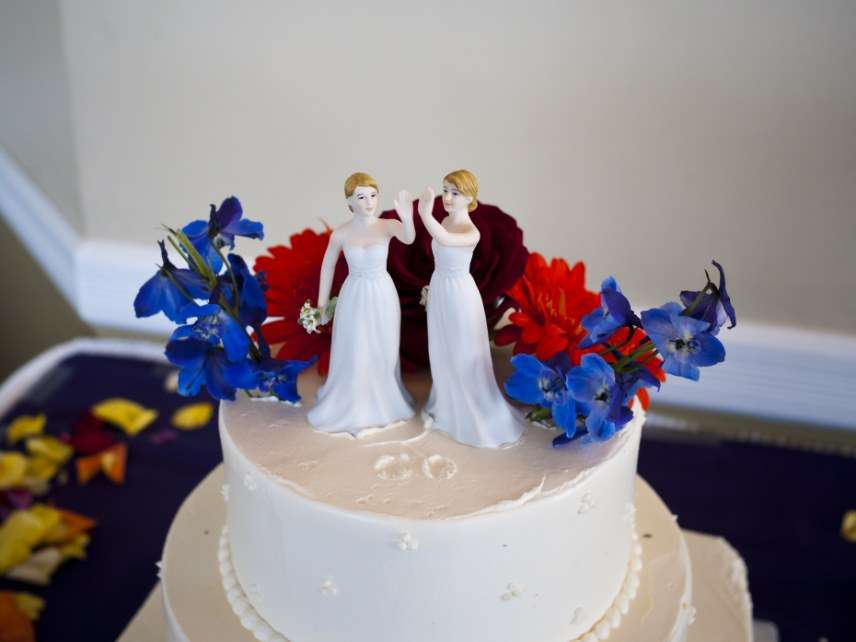Reason Foundation Supports Florists, Bakers in Gay Wedding Case Before Supreme Court
Brief argues custom-made cakes, flowers are expressive acts protected by First Amendment.

Consumer goods like custom floral bouquets and wedding cakes are also acts of expressive artistry protected by the First Amendment. Shops who arrange flowers and bakeries that produce cakes cannot be compelled by law to do so for same-sex weddings if owners have religious objections.
That's the argument presented in an amicus brief submitted to the Supreme Court this week by the Reason Foundation (the non-profit think tank that produces this site and publishes Reason magazine), the Cato Institute, and the Individual Rights Foundation.
The Supreme Court agreed in June to hear the case of Masterpiece Cakeshop Ltd. v. Colorado Civil Rights Commission. The case involves a Lakewood, Colorado, bakery whose owner, Jack Phillips, declined to make a wedding cake for a gay couple due to his objections to same-sex marriage. The state ruled Phillips violated the state's public accommodation laws that prohibit discrimination on the basis of sexual orientation.
Meanwhile, Baronnelle Stutzman, owner of Arlene's Flowers, in Richland, Washington, has faced similar government sanction for refusing to provide floral arrangements for a same-sex wedding. Stutzman is standing on her religious opposition to same-sex marriage in her petition to the Supreme Court.
The Reason Foundation, the Cato Institute, and the Individual Rights Foundation brief encourages the court to consolidate the Stutzman and Masterpiece Bakeshop cases. Considering the cases together would "provide the Court with a more extensive factual record on which to base a decision, as well as help clarify the applicability of the ultimate decision's holding," the brief says.
Essentially, they want the Supreme Court to determine whether flower arrangement is also a form of expressive activity and possibly protected free speech. As it stands, the Supreme Court could issue a ruling narrow enough to cover only wedding cakes.
The brief presents two arguments to encourage the court to decide on behalf of the bakery and the florist. First, arranging flowers or baking a wedding cake is artistic expression protected by the First Amendment. The brief argues the court has previously held a fairly broad view of what counts as symbolic speech, and floral arrangements and wedding cakes should be included:
Art is speech, regardless of whether it actually expresses any important ideas—or even any perceptibly coherent idea at all. Hurley v. Irish-American Gay, Lesbian & Bisexual Group of Boston—which upheld the right of parade organizers not to allow a gay-rights group to march because they did not want to endorse the its message—even went so far as to say that the paintsplatter art of Jackson Pollock, atonal music of Arnold Schoenberg, and nonsense words of Lewis Carroll's Jabberwocky poem are "unquestionably shielded" by the First Amendment.
Second, the brief argues the government is using anti-discrimination laws to compel business owners to participate in same-sex wedding ceremonies, regardless of their religious objections. The lower courts have determined that providing cakes and flower arrangements does not "endorse" same-sex marriage. The brief asks the Supreme Court to reconsider this attitude and argues that these businesses are being ordered to put their stamp of approval on a concept (same-sex marriage) to which they object. The brief uses Wooley v. Maynard, where the Supreme Court previously ordered that New Hampshire couldn't force citizens to display the state's motto on their license plate if they objected to the statement "Live Free or Die":
Surely, no observer would have understood the motto—printed by the government on government-provided and government-mandated license plates—as the driver's own words or sentiments. … Yet the Court nonetheless held for the Maynards. … The Court reasoned that a person's "individual freedom of mind" protects her "First Amendment right to avoid becoming the courier" for the communication of speech that she does not wish to communicate. … People have the "right to decline to foster … concepts" with which they disagree, even when the government is merely requiring them to display a slogan on a state-issued license plate. …
Forcing Barronelle Stutzman and Jack Phillips (the owner of Masterpiece Cakeshop) to use their art to send a message of celebration and approval of same-sex marriages that they sincerely believe to be immoral is, if anything, significantly more invasive of core First Amendment rights than the imposition of a universally issued license plate with a quote hardly anyone could mistake as the driver's own personal opinions.
Some libertarians may be disappointed that the concept of freedom of association (that business owners should be able to choose whom to serve just as customers choose where to shop) doesn't get a defense in the brief. The reality is there's no evidence the Supreme Court will be making a decision that touches on freedom of association at all. The questions the Supreme Court will consider are those the brief addresses: Whether baking a wedding cake is a form of expressive activity and whether requiring bakers to produce these cakes for same-sex couples is a form of compelled speech.
Read the brief below the fold:
SCOTUS Amicus Brief by Scott Shackford on Scribd
